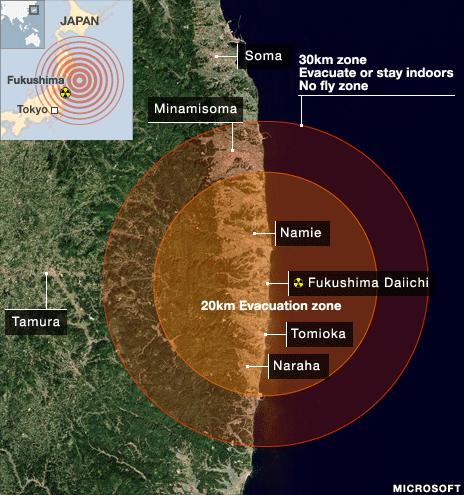Japan earthquake: Emperor Akihito 'deeply worried'
- Published
Watch: Rachel Harvey in Ofunato says the rescue teams are in reality recovering bodies
Japan's Emperor Akihito has said he is "deeply worried" about the crisis his country is facing following last Friday's earthquake and tsunami.
In an extremely rare appearance, the emperor went on live TV to make his first public comments on the disaster, and urged an all-out rescue effort.
He spoke after technicians temporarily abandoned a quake-crippled nuclear plant as radiation briefly surged.
Thousands of people were killed in the 9.0-magnitude quake and tsunami.
The stricken Fukushima Daiichi power facility has sent low levels of radiation wafting into Tokyo, spreading alarm in the city and internationally.
TV stations interrupted programming on Wednesday to show the emperor describing the crisis facing the nation as "unprecedented in scale".
The 77-year-old - deeply respected by many Japanese - said: "I hope from the bottom of my heart that the people will, hand in hand, treat each other with compassion and overcome these difficult times."
Japan's titular head of state - who acceded to the throne in 1989 after the death of his father Hirohito - said he prayed that every victim would be saved.
He spoke as snow blanketed swathes of the disaster zone, where many survivors have little food, water or heat.
About 450,000 people have been staying in temporary shelters, many sleeping on the floor of school gymnasiums.
Nearly 3,700 people are listed as dead, but it is feared the total death toll will top 10,000 following the catastrophe, which pulverised the country's north-east coast.
In other developments:
France urged its nationals in Tokyo to leave the country or move south; two Air France planes were sent to begin evacuation
Australia advised its citizens to consider leaving Tokyo and the most damaged prefectures; Turkey warned against travel to Japan
After losing $620bn (£385bn) in the first two days of this week, Japan's stock market rebounded to finish Wednesday up by 5.7%
Engineers are racing to avert a nuclear catastrophe at the Fukushima Daiichi power plant, 220km (140 miles) from Tokyo.
Watch: Japan's Emperor Akihito addresses the Japanese people
Helicopters deployed to dump water on the facility on Wednesday have been pulled out amid concerns over radiation.
Earlier, the plant's operators evacuated its skeleton crew of 50 workers for about an hour as ground-level radiation spiked.
And yet another fire broke out in a reactor, while smoke or steam billowed from another one.
Winds from the facility are currently blowing north-west out into the Pacific Ocean.
'Boiling point'
Levels of radiation outside the plant have now fallen from 1,000 millisieverts an hour to 600-800. A single dose of 1,000 millisieverts can cause temporary radiation sickness.
The governor of Fukushima prefecture, Yuhei Sato, criticised official handling of the crisis, telling Japan's NHK TV: "The anxiety and anger being felt by people in Fukushima have reached a boiling point."
Tokyo Electric Power Co, which runs the plant, said three-hour power cuts on Wednesday would affect nearly 11 million households.
The government said it had no plans to extend a 20-km (12-mile) evacuation zone around the facility.
Another 140,000 people living between 20-30km of the facility were told on Tuesday not to leave their homes.
The atomic crisis has been caused by the tsunami breaking back-up diesel generators which kept the nuclear fuel cool.
Workers have been dousing the reactors with seawater in a frantic effort to stabilise their temperatures, since the first in a series of explosions rocked the plant on Saturday.
In Tokyo, there were as few people on the streets as there would be on a public holiday, and many shops and offices were shut.
Many people have stocked up on food and water to stay indoors or have simply left the city.
